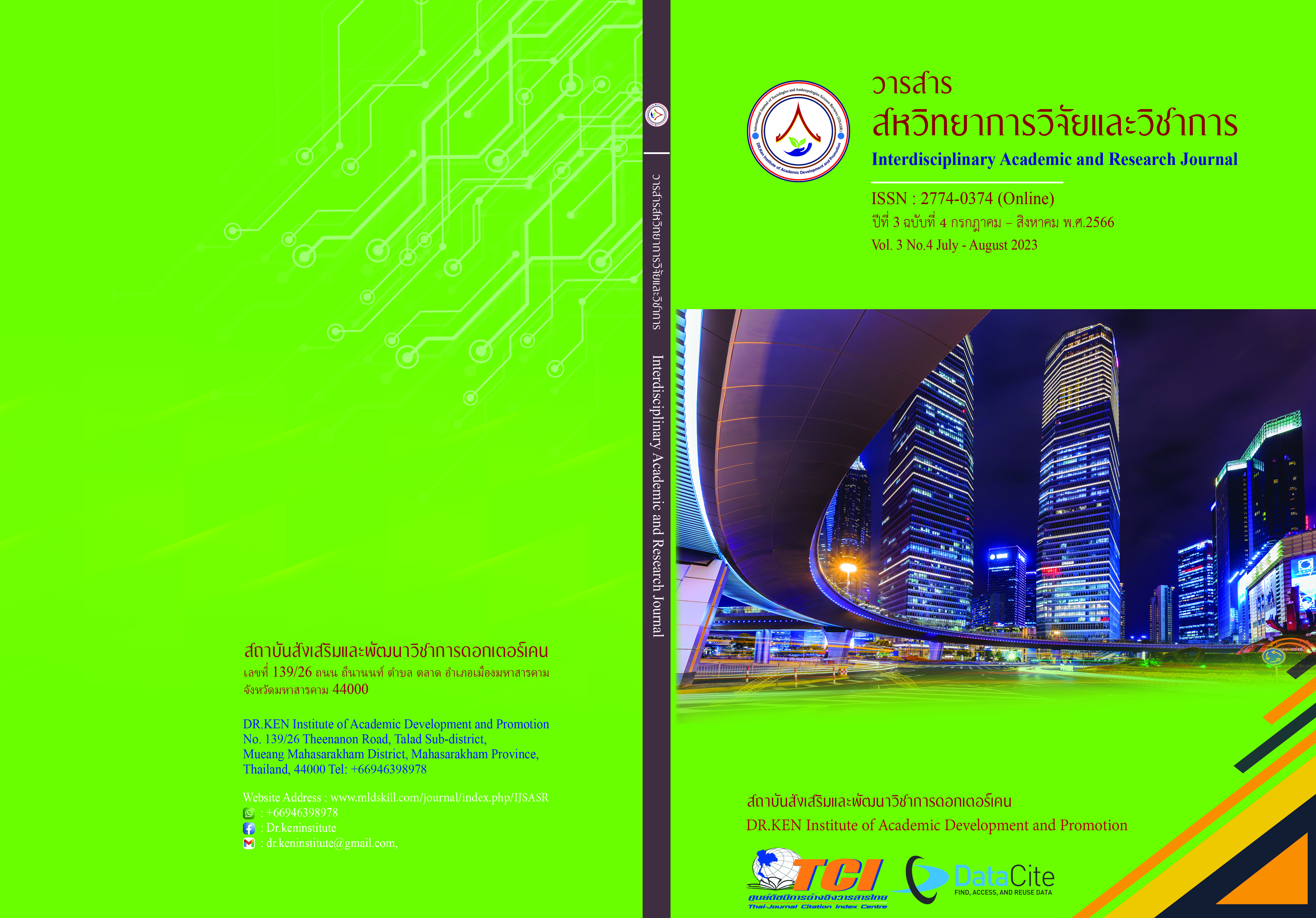Model of Student Leadership Skills Development in the 21st Century, Roi - Et Municipality Schools
DOI:
https://doi.org/10.14456/iarj.2023.223Keywords:
Model of Student Leadership Skills Development; , 21st Century Student Leadership SkillsAbstract
Changes in the 21st century, the leadership and Sufficiency Economy Philosophy are important in the development of students' leadership that is consistent with the global society in the 21st century and the Sufficiency Economy Philosophy, which the researcher has foreseen the problems and applied to research. This research aimed to 1) study background and the desired 21st-century student leadership skills, 2) develop a 21st-century student leadership skills model, and 3) study the findings of the implementation of the developed 21st-century student leadership skills model in Roi-Et Municipality schools. The sample group for this research was 104 teachers from 4 lower secondary schools—Wat Sa Thong Municipality School, Watpa Rerai Municipality School, Nong Ya Ma Municipality School, and Waruwan Municipality School. The tools used in this research were questionnaires. Mean and standard deviation (S.D.) were the statistics used in analyzing the collected data. The research findings were 1) the result of the implementation of the developed 21st-century student leadership skills model, in terms of 4 decision-making skill-related elements, were at high levels; 2) the result of the implementation of the developed 21st cent21st-century leadership skills model, in terms of 4 team building skill related elements, were at high levels; 3) the result of the implementation of the developed 21st-century student leadership skills model, in terms of 3 responsibility skill related elements, were at high levels; and 4) the result of the implementation of the developed 21st-century student leadership skills model, in terms of 5 relationship skill related elements, were at high levels.
References
กระทรวงศึกษาธิการ. (2551). ทศวรรษที่สองของการปฏิรูปการศึกษา. กรุงเทพฯ : โรงพิมพ์สหกรณ์การเกษตรแห่งประเทศไทยจำกัด.
กษมา วรวรรณ ณ อยุธยา. (2550). เอกสารการพัฒนาข้าราชการครูเพื่อให้มีหรือเลือนวิทยฐานะเป็นครูชํานาญการพิเศษ. พิมพ์ครังที่ 2.กรมวิชาการกระทรวงศึกษาธิการ
กัลยรัตน์ เมืองสง. (2550). รูปแบบการพัฒนาภาวะผู้นำ เชิงกลยุทธ์ของผู้บริหารสถานศึกษาขั้นพื้นฐาน. วิทยานิพนธ์ครุศาสตรดุษฎีบัณฑิต สาขาวิชาการบริหารการศึกษา มหาวิทยาลัยบูรพา.
ดุษฎีรัตน์ โกสุมภ์ศิริ. (2558). ภาวะผู้นำแบบดุลยภาพภาวะผู้นำสำหรับศตวรรษที่ 21. Retrieved on June 10, 2016, from: http://leader1234.blogspot.com/2015/09/21-scholarly-article-equilibrium.html
ทิพาวดี เมฆสวรรค์. (2544). กล้าคิด กล้าทำ กล้านำ กล้าเปลี่ยน. กรุงเทพฯ : เอ็กซเปอร์เน็ต.
ปฏิมา นรภัทรพิมล. (2555). การพัฒนาภาวะผู้นำของคณะกรรมการสภานักเรียนระดับมัธยมศึกษา. วิทยานิพนธ์การศึกษาดุษฎีบัณฑิต. สาขาการบริหารการศึกษา. พะเยา : มหาวิทยาลัยพะเยา.
ปรียานุช ธรรมปิยา. (2558). การขับเคลื่อนปรัชญาของเศรษฐกิจพอเพียงด้านการศึกษา(พ.ศ.2549 - พ.ศ.2557). พิมพ์ครั้งที่2. กรุงเทพฯ: ศูนย์การพิมพ์เพชรรุ่ง จำกัด.
พรชัย เจดามาน (2560). ภาวะผู้นําเชิงกลยุทธ์ในศตวรรษที่ 21 เพื่อการเปลี่ยนผ่าน การบริหารจัดการศึกษา 4.0 อย่างยั่งยืน. RMU.J. 13(2), 27-37.
พสุ เดชะรินทร์. (2555). ฤาสาเหตุของปัญหาจะมาจากผู้นำ. หนังสือพิมพ์กรุงเทพธุรกิจ, 17 มกราคม 2555. Retrieved from: http://www.bangkokbiznews.com/blog/blogger/6.
เพ็ญพร ทองคำสุก. (2553). ตัวแบบสมการโครงสร้างภาวะผู้นำการเปลี่ยนแปลงของผู้บริหารสถานศึกษาขั้นพื้นฐาน. วิทยานิพนธ์ปรัชญาดุษฎีบัณฑิต สาขาการบริหารการศึกษา: มหาวิทยาลัยขอนแก่น.
ภิญโญ ทองเหลา, วัฒนา สุวรรณไตรย์, ประยูร บุญใช้ และ อนันท์ งามสะอาด. (2553). การวิจัยปฏิบัติการแบบมีส่วนร่วมเพื่อพัฒนาระบบการเสริมสร้างภาวะผู้นำของครูในการจัดการเรียนรู้ตามแนวคิดปรัชญาเศรษฐกิจพอเพียง. วารสารศึกษาศาสตร์ ฉบับวิจัยบัณฑิตศึกษา มหาวิทยาลัยขอนแก่น, 4 (3), 86–94.
รังสรรค์ ประเสริฐ์ศรี. (2544). ภาวะผู้นำ. กรุงเทพฯ : ธนธัชการพิมพ์.
ลีลาภรณ์ บัวสาย. (2559). ABC งานวิจัยรูปแบบใหม่เพื่อสร้างการเปลี่ยนแปลงในพื้นที่ชุดบริหารงานวิจัย ลำดับที่ 13 สำนักงานกองทุนสนับสนุนการวิจัย. กรุงเทพฯ: สำนักงานกองทุนสนับสนุนการวิจัย
วิจารณ์ พานิช. (2556). การสร้างการเรียนรู้สู่ศตวรรษที่ 21. กรุงเทพฯ : มูลนิธิสยามกัมมาจล.
วิทยากร เชียงกุล. (2547). คู่มือพัฒนาตนเองและพัฒนาภาวะผู้นำ. กรุงเทพฯ : สายธาร.
วิโรจน์ สารรัตนะ (2559). การวิจัยทางการบริหารการศึกษา: แนวคิดและกรณีศึกษา. พิมพ์ครั้งที่ 6. กรุงเทพฯ : บริษัทอักษราพิพัฒน์.
สัมฤทธิ์ กางเพ็ง และประยุทธ ชูสอน. (2557). ภาวะผู้นำแบบโลกาภิวัตน์ : แนวคิดและการวิจัย. มหาสารคาม : อภิชาตการพิมพ์.
สัมฤทธิ์ กางเพ็ง. (2551). ปัจจัยการบริหารที่มีอิทธิพลต่อประสิทธิผลของโรงเรียน : การพัฒนาและตรวจสอบความตรงของตัวแบบ. วิทยานิพนธ์ปริญญาศึกษาศาสตรดุษฎีบัณฑิต สาขาการบริหารการศึกษา. บัณฑิตวิทยาลัย : มหาวิทยาลัยขอนแก่น.
สำนักพัฒนากิจกรรมนักเรียน สำนักงานคณะกรรมการการศึกษาขั้นพื้นฐาน. (2557). คู่มือสภานักเรียน ปี 2557. กรุงเทพฯ : โรงพิมพ์สหกรณ์การเกษตรแห่งประเทศไทยจำกัด.
สุเทพ พงศ์ศรีวัฒน์. (2550). ภาวะผู้นำ ทฤษฎีปฏิบัติ : ศาสตร์และศิลป์สู่ความเป็นผู้นำที่สมบูรณ์. กรุงเทพฯ : วิรัตน์ เอ็ดดูเคชั่น.
เสริมศักดิ์ วิศาลาภรณ์. (2552). ภาวะผู้นำในประมวลสาระชุดวิชาทฤษฎีและแนวปฏิบัติในการบริหารการศึกษา หน่วยที่ 5-8. พิมพ์ครั้งที่ 9. นนทบุรี: สุวีริยาสาส์น.
Daft, R.L. (1999). Leadership: Theory and Practice. Fort Worth Tex: Dryden Press.
Popper, M., & Mayseless, O. (2007). The building blocks of leader development: A psychological conceptual framework. Leadership & Organization Development Journal, 28(7), 664–684. https://doi.org/10.1108/01437730710823905
Downloads
Published
How to Cite
Issue
Section
License
Copyright (c) 2023 Bussaba Seeme, Kritkanok Dongchatom, Chayakan Ruangsuwan

This work is licensed under a Creative Commons Attribution-NonCommercial-NoDerivatives 4.0 International License.
Copyright on any article in the Interdisciplinary Academic and Research Journal is retained by the author(s) under the under the Creative Commons Attribution-NonCommercial-NoDerivatives 4.0 International License. Permission to use text, content, images, etc. of publication. Any user to read, download, copy, distribute, print, search, or link to the full texts of articles, crawl them for indexing, pass them as data to software, or use them for any other lawful purpose. But do not use it for commercial use or with the intent to benefit any business.
















.png)


